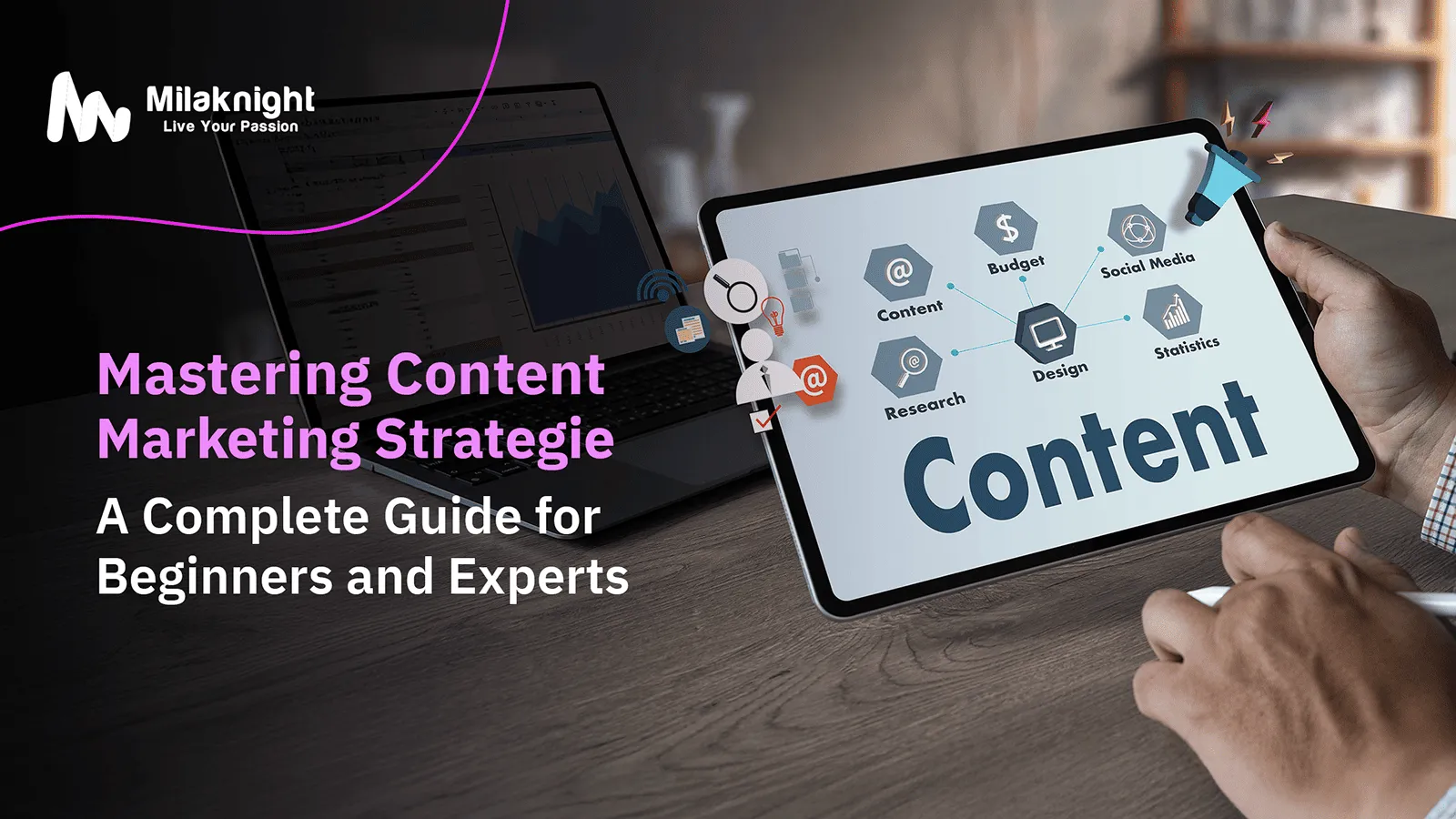In today’s digital landscape, content marketing strategie is a fundamental pillar for any successful marketing campaign. Whether you’re a startup, a small business, or a large corporation, understanding how to leverage content effectively can transform your brand presence, drive engagement, and boost conversions.
What is Content Marketing?
Content marketing is the art and science of creating and distributing valuable, relevant, and consistent content to attract and retain a clearly defined audience — ultimately, to drive profitable customer action. It differs from traditional advertising by focusing on providing information and building trust rather than pushing a direct sales message.
Why is Content Marketing Important in Digital Marketing?
Content marketing plays a vital role in digital marketing by:
- Enhancing SEO efforts with high-quality website content marketing.
- Engaging audiences on social media platforms through creative content marketing.
- Educating potential customers and nurturing leads.
- Building brand authority and loyalty.
- Supporting paid advertising campaigns by providing valuable landing page content.
Read More: Paid Ads vs Organic Growth | Pros and Cons for Your Business
Developing a Successful Content Marketing Strategie
Creating an effective content marketing strategie involves several key steps:
1. Define Your Goals
Clearly outline what you want to achieve. This could be increasing website traffic, generating leads, improving brand awareness, or boosting sales.
2. Know Your Audience
Develop detailed buyer personas to understand your audience’s demographics, preferences, pain points, and content consumption habits.
3. Content Planning and Creation
Plan your content types and topics through content marketing planning tools and calendars. This includes blog posts, videos, infographics, podcasts, and more. Focus on creating marketing content that aligns with your audience’s needs and business goals.
4. Distribution Strategy
Determine which channels to use for distribution—your website, email newsletters, and especially social media platforms for social media content marketing and social content planning.
5. Measure and Optimize
Use analytics tools to track performance, engagement, and conversion metrics. Continuously refine your strategy based on data.
Read More: Paid Ads vs Organic Growth | Pros and Cons for Your Business
Content Marketing for Beginners: Tips to Get Started
For beginners, starting with content marketing can seem overwhelming. Here are some tips:
- Start small and focus on quality over quantity.
- Use simple language and clear messaging.
- Leverage social media to amplify your content reach.
- Repurpose content across multiple platforms.
- Stay consistent with publishing schedules.


Creative Content Marketing: Standing Out in a Crowded Market
Creativity is key to making your content memorable. Use storytelling, compelling visuals, interactive elements, and personalized messages to engage your audience. Experiment with formats like live videos, webinars, and user-generated content.
Social Media and Content Marketing: A Powerful Combination
Social media platforms provide a perfect avenue for distributing content and engaging with your audience. Combining social media and content marketing enables brands to:
- Reach wider audiences with targeted ads.
- Foster two-way communication.
- Gather customer feedback.
- Build communities around your brand.
Website Content Marketing: Your Digital Storefront
Your website content is often the first interaction potential customers have with your brand. Ensure your content is optimized for SEO, easy to navigate, and provides clear calls to action. High-quality blog posts, product descriptions, and landing pages contribute significantly to your overall content marketing success.
Read More: Paid Ads vs Organic Growth | Pros and Cons for Your Business
The Role of Planning in Content Marketing
Without a solid content marketing planning process, efforts can become scattered and ineffective. Develop an editorial calendar, set deadlines, assign responsibilities, and plan for seasonal or event-based content to keep your marketing on track.
Integrating Content Marketing with SEO for Maximum Impact
One of the most effective ways to boost your online visibility is by combining content marketing with Search Engine Optimization (SEO). By creating high-quality, keyword-rich articles, blog posts, and web pages, you improve your chances of ranking higher on search engines. This synergy allows your website content marketing efforts to attract organic traffic over time. A strategic approach involves thorough keyword research, optimizing meta tags, and ensuring content answers the questions your audience is actively searching for.
The Importance of Social Content Planning in Consistency
Consistency is crucial in any successful social media content marketing campaign. This is where social content planning becomes invaluable. By scheduling posts in advance and maintaining a regular publishing cadence, brands can keep their audience engaged and build trust over time. Effective planning also enables marketers to align content with product launches, seasonal events, or trending topics, maximizing relevance and engagement.
Crafting Compelling Calls-to-Action in Marketing Content
Creating valuable content is essential, but without strong calls-to-action (CTAs), your audience might not take the next step. Whether it’s subscribing to a newsletter, downloading a guide, or making a purchase, a clear and persuasive CTA guides your audience through the marketing funnel. When developing your content marketing strategie, integrate CTAs thoughtfully within blog posts, social media updates, and landing pages to improve conversion rates.
Measuring the ROI of Your Content Marketing Efforts
To justify investment and guide future strategies, measuring the return on investment (ROI) of your content marketing is vital. Key performance indicators (KPIs) include website traffic, engagement metrics (likes, shares, comments), lead generation, and sales conversions. Tools like Google Analytics, HubSpot, and social media insights help track these metrics, allowing marketers to optimize campaigns and allocate resources effectively.
The Future of Content Marketing: Trends to Watch
Content marketing is evolving rapidly with emerging technologies such as artificial intelligence, voice search, and interactive content. Marketers should stay abreast of these trends to keep their strategies innovative and competitive. For example, AI-powered tools can assist in creating marketing content more efficiently, while interactive formats like quizzes and polls enhance audience engagement. Staying flexible and embracing new trends will ensure your content marketing strategie remains effective in a dynamic digital environment.
Conclusion:
A well-executed content marketing strategie is essential in today’s digital marketing ecosystem. It requires thoughtful planning, creativity, and consistent execution. Whether you’re a beginner or looking to refine your approach, investing in content marketing will pay dividends by building lasting relationships with your audience and driving business growth.
Read More: Paid Ads vs Organic Growth | Pros and Cons for Your Business
